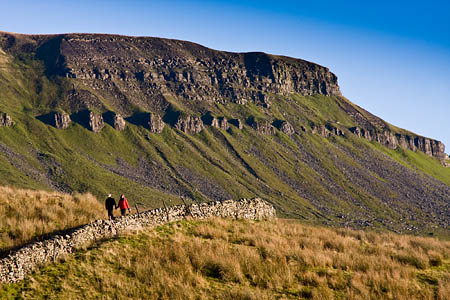England’s national trails are at serious risk of decline under Government proposals, the Ramblers said.
The UK’s biggest walkers’ charity said it was seriously concerned that new coalition Government proposals on the future management of the country’s long-distance paths would see a dramatic fall in the quality of the gems of the network.
It launched its Campaign for National Trails to persuade Whitehall to put in place a national body to oversee the work of the planned local trail partnerships to which Natural England, the Government’s advisory body on the outdoors, wants hand control of the routes. These would be made up of local authorities, businesses and volunteers.
The Ramblers said: “The family of 13 national trails, which includes long-distance paths such as the Pennine Way and the South West Coast Path, contribute more than 2,500 miles of some of the best walking opportunities in the country and attract an estimated 12 million visits each year from around the world.
“The Ramblers, who played a key role in establishing the trails, are concerned that the lack of a national champion to oversee, guide and support these local trail partnerships will leave them vulnerable, resulting in a fragmented network with inconsistent quality between trails and cash strapped local authorities unable to sustain funding.
“As the guardians of the nation’s footpath network, Britain’s walking charity fears that this will damage a well-loved national asset as well as having a negative knock on effect on tourism and the economy.
“The South West Coast Path alone is estimated to generate £307m for the regional economy every year.”
Ramblers chief executive Benedict Southworth added: “We want to ensure all 13 trails reach their full potential in the future.
“We would like to see Government rethink its plans and are ready to work with them to take a leading role in the future support and promotion of these national treasures.
“We are deeply concerned that if current proposals go ahead, the quality of the national trails network will be at risk, compromising the primary goal of world-class long-distance routes.
“We feel very strongly that there is a need for a national body or association to work together with local trail partnerships.”
The Ramblers said with no contingency funds in case of extreme flooding or other natural disasters; no plan to integrate the English Coastal Path – which on completion will double the current length of National Trails in England; and no overall body in place to hold accountable if local trail partnerships fail, the proposals constitute a serious gamble on what it they said is such a precious asset to the country.
The Ramblers’ concerns are echoed by the Open Spaces Society, the country’s oldest national conservation charity.
In its submission to Natural England’s consultation on the paths, it said: “The 13 National Trails are among England’s finest assets.
“Government must continue to invest in them and promote them because they provide health and happiness to millions of people and are well worth every penny.”
The society’s general secretary Kate Ashbrook, who is also president of the Ramblers, said: “The national trails are immensely important as a national family, providing challenge and inspiration, fresh air and freedom for the nation’s walkers, as well as to visitors from overseas.
“They are of international renown and envy. But their standards could all too easily slip if Natural England does not maintain the investment in them.
“The highway authorities make a vital contribution to the trails’ maintenance, but they are slashing their rights-of-way budgets and the risk is that either they will put money in to the national trails at the expense of the rest of the network, or that the trails will suffer because the authorities cannot help to fund them.
“Government should recognise the value of the trails to our economy and invest in them, not devolve them to local structures and volunteers. The trails must remain as a national family of top-quality routes, alongside the nation’s vital network of public paths.”
Britain’s first national trail, the Pennine Way, was opened in 1965 after a long campaign sparked by journalist and rambler Tom Stephenson.


